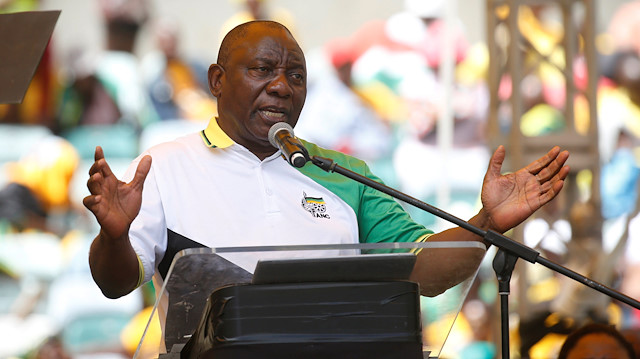
Heads of five diplomatic missions express regret over not using proper channels to convey their concerns over corruption
South Africa summoned five diplomats Monday to express its displeasure over a letter they had jointly written to President Cyril Ramaphosa regarding their countries’ concerns about corruption allegations.
The letter was sent directly to Ramaphosa without first contacting the Foreign Ministry, breaching a diplomatic channel of communication, according to the Department of International Relations and Cooperation (DIRCO).
Local media reported Sunday that the embassies of the United States, United Kingdom, Switzerland, Germany and Netherlands had sent the letter warning Ramaphosa to enforce strict rule of law by dealing with corrupt officials or lose investor confidence.
In a joint statement, however, the embassies denied media reports that they had sent an official letter to the government but instead said they had only sent a ‘discussion paper’ they had drafted in June 2018 ahead of Ramaphosa’s investment conference aimed at attracting investors.
“This discussion paper was intended to support South Africa’s investment drive and to underpin our constructive dialogue with the South African government,” the embassies said, without indicating whether they had advised Ramaphosa to deal harshly with corrupt officials.
“The heads of the diplomatic missions regretted the misunderstanding and further clarified that the discussion paper had been sent to the presidency to contribute to the dialogue on how South Africa can attract more foreign direct investment,” DIRCO said in a separate statement.
The diplomats agreed at the conclusion of their meeting with DIRCO that in future, proper diplomatic channels and protocols will be followed in all diplomatic communications.
“The heads of the diplomatic missions also reiterated their commitment to working actively in support of South Africa’s investment drive,” DIRCO said.
The South African government has been grappling with a number of corruption scandals involving some minsters and other government officials.
Last year, the ruling African National Congress (ANC) was forced to ask its former leader, Jacob Zuma, to resign as president after he was implicated in several corruption scandals.
His successor, Cyril Ramaphosa, is largely viewed as an anti-corruption crusader. But analysts say he cannot take strong action against corrupt government officials because he reportedly ‘fears’ losing support from ministers and ANC cadres who could join other parties and refuse to campaign for him if he prosecutes or fires them.
South Africa will hold key elections in May to choose a new National Assembly and legislatures in each province.





